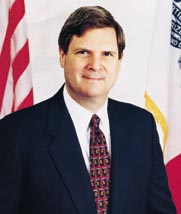|
| |||||
|
IOWA OFFICIAL REGISTER | |||||

| |||||
|
TOM VILSACK Governor | |||||
|
Mt. Pleasant (D)
Birth: December 12, 1950, Pittsburgh, PA. Parents: Bud and Dolly Vilsack. Education: Graduated from Shady Side Academy; A.B. Hamilton College, 1972; Albany Law School, Union University, 1975. Spouse: Ann Christine Vilsack. Children: 2 sons, Jess William and Douglas James. Profession and Activities: Partner in Bell and Vilsack Law Office, 1975-1998. Former mayor of Mount Pleasant, 1987-1992. State Senator, 49th District, 1992-1998. Member: St. Alphonsus Roman Catholic Church. Salary: $104,352. Term: expires January 2003. | |||||
|
OFFICE OF THE GOVERNOR
State Capitol, Des Moines, IA 50319 (515) 281-5211 www.state.ia.us/government/governor
The supreme executive power of the state is vested in the governor, whose term of office is four years. A person is eligible for the governorship who is a citizen of the United States and a resident of Iowa for two years preceding the next election, and has attained the age of 30 years at the time of said election. The governor appoints all principal officers of the state not elected by the people and certain other officers connected with the state government, subject to confirmation by a 2/3 vote of the members of the State Senate. When any office, from any cause, becomes vacant, and no mode is provided by the constitution and laws for filling such vacancy, the governor has the power to fill such vacancy. The chief executive is also responsible for taking final action on all laws enacted by the General Assembly. The governor may approve, by signing, or disapprove, by veto, a bill passed by both houses of the Legislature or the governor may allow a bill to become law without signing it. The governor may also call an extra session of the General Assembly when there is necessity of action and may order adjournment of the Legislature if the members cannot reach agreement when to adjourn. The governor must report to the Legislature the financial condition of the state and a recommendation for any appropriate action concerning the financial status. The governor has the task of granting or denying executive clemency in the form of restoration of voting rights, commutation of sentences, pardons, remissions of fines and forfeitures, and gun licenses privileges. The specific statutory duties of the office of governor include being commander-in-chief of the military forces of Iowa, chairperson of the Executive Council and the authority to grant or deny extradition whenever there is a request for a fugitive from justice. The governor has many obligations as the chief executive to the people of Iowa. These include meeting different groups or individuals to discuss problems which in some way affect government; conferring with Iowa's congressional delegation to discuss national issues which affect Iowa; promoting Iowa and its manufactured and agricultural products; answering correspondence from the electorate and endeavoring to meet visitors who wish to visit the Capitol and the governor's office. Governor Tom Vilsack's top priority is for Iowans to receive the best education for today and tomorrow. Governor Vilsack believes if every child has a strong foundation in the basics, such as reading, they will be able to compete for the jobs of the future. He also believes that working Iowans deserve opportunities to develop the skills necessary to succeed in the workforce. In addition to offering specific solutions to improve our schools, Governor Vilsack is working to provide adequate health care for our children and senior citizens and ensure our water is safe for our children to drink. In summary, the governor is the chief administrator of the state government and is held responsible by the citizenry for the effective and efficient administration of the various state departments and agencies in Iowa. | ||
|
Governor's Staff
Chief of Staff, John Norris; General Counsel,
N. Brian Gentry; Policy Dir., John Cacciatore; Administration
Dir., Elisabeth Buck; Communications Dir., Joe Shannahan;
Governor's Scheduler, Matthew Paul; Legislative Affairs Dir.,
Greg Nichols; Intergovernmental Affairs Dir., Joanne Oldson;
Outreach Dir., Dusky Terry; Appointments Coordinator,
Catherine Jury; Volunteerism Coordinator, Mike Milligan; Correspondence
Coordinator, Sally Adams; Deputy General Counsel, Stephanie
Pickens; Deputy Communications Dir., Madhu Chugh; Governor's
Executive Assistant, Deb Madison; Assistant to Chief of Staff,
Monica Seigel Fischer; Receptionist, Rose Mary Pratt; Administrative
Assistant to Policy Dir., Jean Cooper; Administrative Assistant
to General Counsel,
| ||